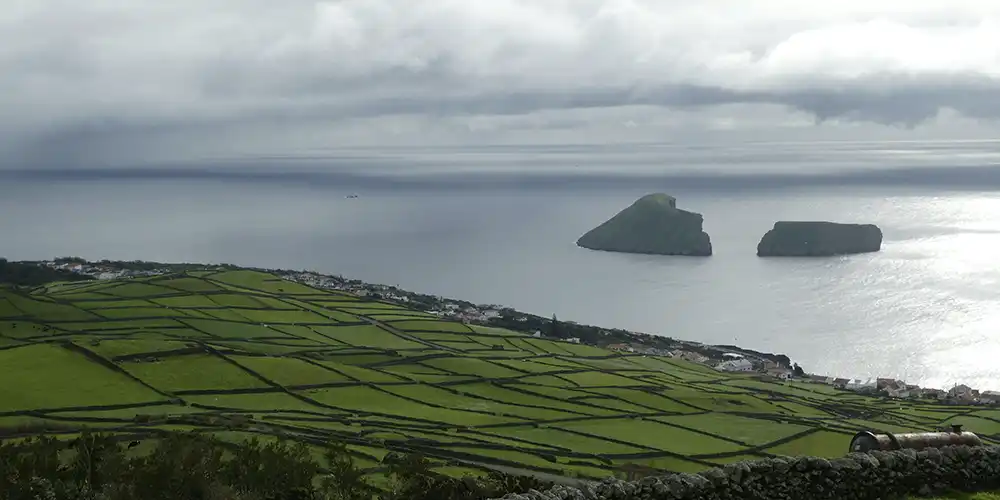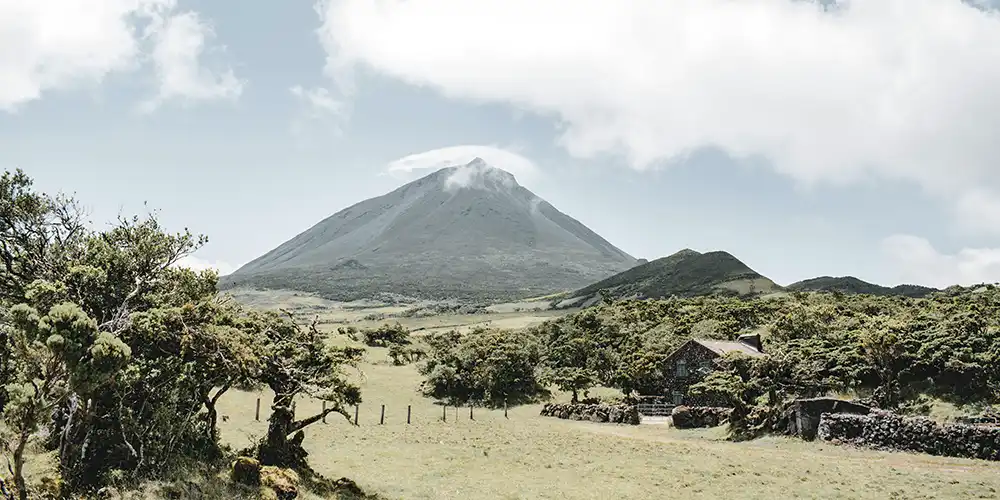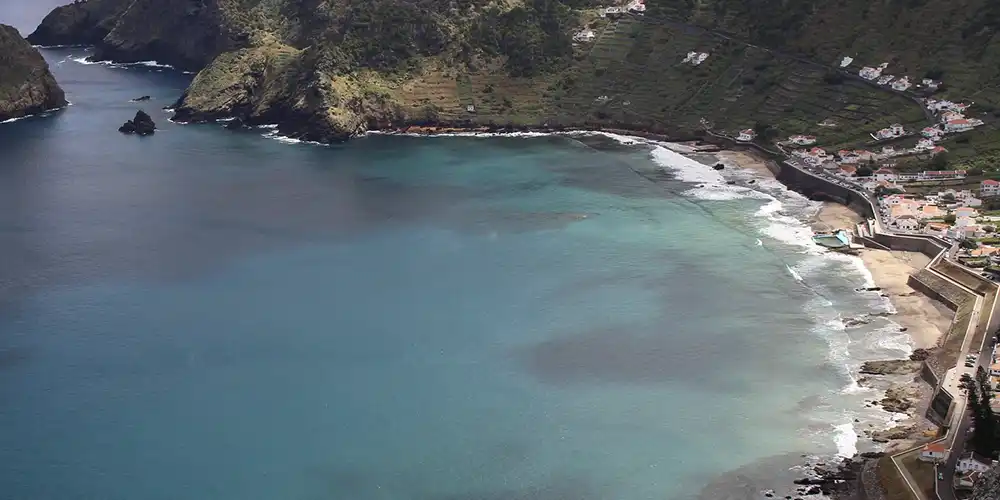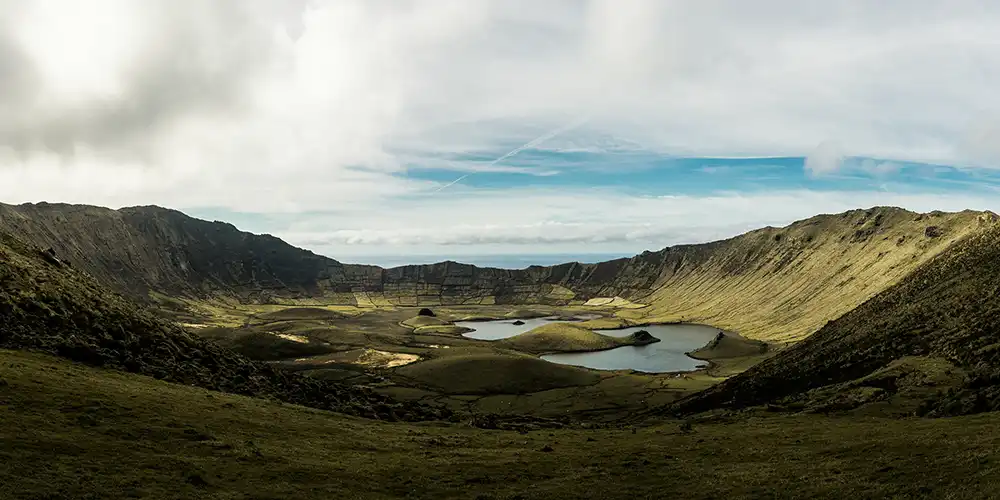Buying property in the Azores has become an increasingly attractive option for those seeking a balance between natural beauty, affordable real estate, and the security of owning property within the European Union.
This Portuguese archipelago, set in the middle of the Atlantic Ocean, offers lush landscapes, volcanic peaks, thermal springs, and charming coastal towns that feel worlds apart from the mainland. Yet, thanks to direct flights from Europe and North America, the islands remain surprisingly accessible.
In this article, we’ll take a look at all the factors involved in buying property in the Azores, and you’ll also find out more about:

Investing in property in the Azores is not just a lifestyle choice but a strategic one.
Real estate values across the nine islands are significantly lower than those in mainland Portugal and other European markets, yet demand has steadily increased.
This rising interest is driven by the region’s growing reputation as a sustainable tourism destination, bolstered by direct international flights and an influx of eco-conscious travelers seeking authentic experiences.
As tourism expands, short-term rental opportunities provide consistent income potential, while long-term property appreciation is expected as foreign interest grows.
Owning property in the Azores carries intrinsic value in addition to financial returns. It grants a foothold in the European Union, ensuring stability in a safe and politically secure environment.
The islands’ limited development and strong environmental protections mean that properties maintain their exclusivity and scarcity, which drives values higher over time.
Few European real estate markets can rival the Azores for investors seeking to balance affordability with growth potential.
The Azores real estate market provides a unique alternative to mainland Portugal’s real estate market and the more famous island destination of Madeira.
While cities like Lisbon, Porto, and the Algarve have experienced significant price hikes over the past decade, the Azores remain relatively affordable, with property values often well below the national average.
This affordability makes the archipelago particularly appealing to international buyers looking to enter the Portuguese property market without the high costs associated with mainland hotspots.
In contrast to Madeira, the Azores are characterized by a quieter lifestyle and a less commercialized property market. Madeira has long been established as a tourist and expatriate haven, attracting higher prices due to its developed infrastructure and year-round resort appeal.
On the other hand, the Azores are just beginning to attract international interest, creating opportunities for buyers to invest before prices rise.
Strict development regulations are in place to protect the islands’ pristine environment, resulting in a naturally limited supply that enhances long-term investment potential.
Average property prices
One of the most significant advantages of buying property in the Azores is its affordability. On average, property prices across the nine islands are significantly lower than in mainland Portugal or Madeira.
While prime areas in Lisbon and Porto regularly see prices exceeding €4,000 per square meter, and Madeira averages between €2,000 and €2,500 per square meter, properties in the Azores typically range from €900 to €1,500 per square meter, depending on the island and specific location.
Even in the capital, Ponta Delgada on São Miguel Island, buyers can find apartments and houses at prices well below those found in Portugal’s urban centers.
Rural areas and smaller islands, such as Flores, Graciosa, or Santa Maria, often offer even more competitive prices, sometimes dropping below €800 per square meter, although these markets are less liquid.
As demand increases from domestic buyers and international investors, prices have steadily grown, particularly on São Miguel and Terceira, where tourism and infrastructure development are most robust.
Types of property available
The Azores property market is diverse, offering options appealing to lifestyle buyers and investors. From traditional farmhouses to modern apartments, the islands provide opportunities that reflect their unique character and growing international appeal.
Here are the main types of properties you’ll find across the archipelago:
Traditional stone cottages and farmhouses: These rustic homes, often in need of renovation, are set in rural or coastal locations. They are ideal for buyers seeking authentic island charm or renovation projects.
New-build apartments and townhouses: Found mainly in urban centers like Ponta Delgada, Angra do Heroísmo, and Horta, these modern properties cater to those who value convenience and amenities.
Coastal villas and guesthouses: Popular among lifestyle buyers and investors looking for rental potential in São Miguel and other tourist-friendly islands.
Agricultural land and development plots: These are suitable for eco-tourism ventures, farming, or custom builds, reflecting the islands’ agricultural heritage and sustainability focus.

Tourism has become one of the strongest drivers of the Azores’ economy, directly influencing property rental demand.
Visitor numbers have risen steadily over the past decade, aided by direct flights from Europe and North America, and a growing reputation as a sustainable travel destination. This has created consistent demand for short-term rental properties, particularly on São Miguel, Terceira, and Faial.
On average, rental yields in the Azores are competitive with other parts of Portugal, typically between 4 percent and 6 percent annually, depending on location, property type, and management approach.
Properties in Ponta Delgada or near tourist attractions like Sete Cidades, Furnas, or the UNESCO-listed Angra do Heroísmo tend to achieve higher occupancy rates and better returns.
Villas, guesthouses, and well-located apartments with modern amenities are especially attractive to visitors.
Unlike the saturated rental markets of Lisbon, Porto, or Madeira, the Azores still offer space for growth. Limited supply and increasing international recognition suggest that yields will remain strong and may even improve as tourism expands.

The steps to buying property in the Azores are almost identical to those for buying property in Portugal, since the islands follow national Portuguese law.
The main difference is local market dynamics: fewer properties, slower transactions, and sometimes limited financing options compared to Lisbon, Porto, or the Algarve.
Step 01/ Financing Your Property
Before starting the property purchase process in the Azores, carefully assess your financial situation and explore your financing options.
If you plan to take out a mortgage, research several Portuguese banks to compare interest rates, repayment terms, and eligibility criteria. Many Portuguese banks cater specifically to international buyers, so it’s worth taking the time to identify the lender that best suits your profile and financial goals.
Step 02/ Finding the Right Property with the Help of an Agent
When searching for property in the Azores, start by identifying your preferred locations, property types, and budget. Consider practical factors such as accessibility, local amenities, proximity to essential services, and potential rental income if you plan to invest.
Working with a licensed real estate professional can greatly simplify your search. A buyer’s agent, in particular, acts exclusively on your behalf and can provide access to off-market listings, negotiate favorable terms, and guide you throughout the acquisition process.
When selecting an agent, ensure they hold an AMI license issued by IMPIC (Instituto dos Mercados Públicos, do Imobiliário e da Construção), which is required to mediate real estate transactions legally in Portugal.
Step 03/ Making an Offer and Negotiating
Once you find your ideal property, the next step is to make an offer and begin negotiations.
It’s important to distinguish between a real estate agent and a buyer’s agent:
- Real estate agents represent the seller and aim for a higher sale price, earning more commission.
- Buyer’s agents work exclusively for you, ensuring your interests are prioritized.
Collaborating with a buyer’s agent during negotiations can help secure the most favorable purchase terms and protect you from potential conflicts of interest.
Step 04/ Reservation Agreement
After your offer is accepted, you’ll typically sign a Reservation Agreement, which shows your intent to purchase and ensures the property is removed from the market while you finalize your decision.
A reservation fee, usually between €5,000 and €15,000, is paid at this stage. This amount can often be refunded if you decide not to proceed—provided this is clearly stated in the agreement. Always review the refund terms carefully before signing.
Step 05/ Promissory Contract (CPCV)
The next stage is signing the Promissory Contract (Contrato Promessa de Compra e Venda, or CPCV). This legally binding agreement formalizes the transaction and typically requires a deposit of around 10 percent of the purchase price.
The CPCV should ideally be signed in the presence of a notary, and both parties must thoroughly understand the terms before proceeding. Once signed, both buyer and seller are legally obligated to complete the sale under the agreed conditions.
Step 06/ Signing the Final Deed
The final stage of the process is signing the Final Deed (Escritura Pública de Compra e Venda) before a Notary. This document officially transfers ownership of the property from seller to buyer.
Before signing, review all documents carefully with your legal representative to clarify any outstanding issues. The remaining balance, along with applicable taxes and fees, must be paid at this time.
Once the deed is signed, the property is officially yours—marking the successful completion of your purchase in the Azores.
Before putting your signature on paper, there are a few things you’ll need, including:
- Obtain a Portuguese tax number (NIF): Required for all property transactions in Portugal, you must obtain a Portugues tax identification number and non-residents must also appoint a tax representative in Portugal.
- Open a Portuguese bank account: Necessary for transferring funds, paying taxes, and handling transaction costs, you must open a bank account in Portugal.
With nine islands to choose from, it can be daunting to select the perfect location. São Miguel, the largest and most developed island, is often the top choice for buyers seeking modern infrastructure and strong rental potential.
Its capital, Ponta Delgada, combines traditional Portuguese charm with convenient access to restaurants, shops, and international flights.
Other than looking around São Miguel, here are some other islands to consider for where to buy property in the Azores:

1. Terceira: Known for its rich history and vibrant local culture, it has a strong tourism appeal, ideal for short-term rental investments.

2. Pico: Famous for its vineyards and dramatic volcanic landscapes, Pico is perfect for buyers interested in eco-tourism or rural retreats. Areas around Madalena and São Roque do Pico are growing hotspots for sustainable and boutique hospitality projects.

3. Santa Maria: Santa Maria offers some of the best conditions for year-round living. The Vila do Porto area provides easy access to infrastructure and the island’s airport, making it attractive for retirees.

4. Corvo: The smallest and most remote island, Corvo offers very few properties but unmatched tranquility and authenticity. It’s suited for those seeking isolation, simplicity, and an escape from modern life rather than a traditional investment.
Foreign buyers can access mortgage financing in Portugal, including the Azores, through several national and regional banks. Banks in Portugal typically offer mortgages covering up to 70 percent of the property’s value for non-residents and 80 to 90 percent for residents, with repayment terms usually ranging from 20 to 30 years.
Interest rates are generally variable, tied to the Euribor (Euro Interbank Offered Rate), plus a small margin set by the bank. Some banks also offer fixed-rate options, which can provide greater predictability in long-term budgeting.
To secure financing, buyers must provide documentation such as proof of income, tax returns, and a NIF. Opening a local bank account is also required, and many international buyers find it beneficial to work with a mortgage broker familiar with Portugal’s lending environment.
When purchasing real estate in the Azores, buyers will come across several property taxes:
IMT (Property Transfer Tax): The IMT is a one-time payment made upon purchase, calculated on a sliding scale based on the property’s price and whether it will serve as a primary or secondary residence. For most properties, IMT rates range from 1 percent to 8 percent.
Stamp Duty: Stamp Duty (Imposto do Selo) is an additional tax levied by the Portuguese government on property transactions. It is 0.8 percent of the total value stated in the deed and must be paid at the time of purchase.
IMI (Municipal Property Tax): After the purchase, an annual municipal tax (IMI) is calculated on the property’s taxable value, generally ranging from 0.3 percent to 0.45 percent.
Financing a property in the Azores involves a series of key steps that start with assessing your eligibility and selecting the right financial institution.
Begin by determining how much you can borrow based on your income, assets, and existing debts. Portuguese banks, including Caixa Geral de Depósitos, Millennium BCP, and Novo Banco, all provide mortgage solutions for foreign investors.
All mortgages in Portugal need to comply with the Bank of Portugal regulations. There are two main types of mortgages:
- Fixed-rate mortgages: This type of mortgage offers stability to the lender. They have a constant rate over a set period, typically 3 to 30 years, with a penalty for early repayment.
- Variable-rate mortgages: Variable-rate mortgages fluctuate based on an index, usually Euribor, where monthly payments are adjusted every 6 to 12 months. Early repayments incur a standard penalty of 0.5 percent.
Once you’ve chosen a lender, you’ll typically need to provide a down payment—usually 30 percent to 40 percent of the property price for non-residents—and secure a formal loan approval based on your financial documentation and the bank’s valuation of the property.
Before finalizing your mortgage, consider working with a Portuguese mortgage advisor or financial consultant who can help compare loan options and navigate local regulations.
Additionally, it’s advisable to secure life insurance and property insurance, both of which are standard requirements for mortgage approval in Portugal.

The Azores offer an exceptional quality of life, defined by safety, affordability, pristine natural surroundings, and a relaxed pace that encourages a healthy, balanced lifestyle. The islands are known for their mild year-round climate, and low cost of living compared to mainland Europe.
Healthcare in Portugal, and by extension, the Azores, is of a high standard, with access to both public and private medical services. Residents are covered under Portugal’s Serviço Nacional de Saúde (SNS), while many expats opt for affordable private health insurance to access faster, multilingual care.
Utilities in the Azores are reliable and reasonably priced, with costs generally lower than in mainland Portugal.
Electricity, water, and internet services are well-developed across the main islands, particularly São Miguel and Terceira, though some of the smaller islands may experience occasional service interruptions due to weather conditions.
Broadband internet and mobile coverage are widely available, making remote work feasible for expats. Waste collection, recycling, and renewable energy initiatives are also actively promoted.
For those wishing to relocate, several visa options make it relatively straightforward to move to the Azores. Non-EU citizens can apply for Portugal’s D7 Visa or the Portugal Digital Nomad Visa (D8) for remote workers.
Why choose Global Citizen Solutions for your Immigration Visa?
GLOBAL APPROACH BY LOCAL EXPERTS
- GCS has offices located across Portugal.
- Members of the US-Portugal and UK-Portugal Chambers of Commerce in Portugal, and the Investment Migration Council (IMC).
- Our expert team can help you throughout your journey to secure your Visa.
100% APPROVAL RATE
- Our successful track record in applications provides reassurance to applicants.
- We have helped clients from more than 35 countries secure residency in Portugal.
ALL-ENCOMPASSING SOLUTION
- With a single channel of communication, our approach ensures that you have complete clarity on your application.
- Our BeGlobal® Onboarding System allows for a total flow of information.
TRANSPARENCY AND PRIVACY
- Our pricing is clear and detailed, you will not face any hidden costs.
- All data is stored within a GDPR-compliant database on a secure SSL-encrypted server.

